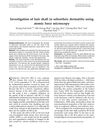Search
for
Did you mean Non-inflammatory Alopecia?
Learn
5 / 12 resultslearn Osteopontin
signaling protein that, when suppressed, may grow hair by reducing inflammation and stem cell loss
learn Scalp Micropigmentation
scalp tattoos to mimic the appearance of light stubble
learn Exosomes
Microscopic delivery system that sends growth-promoting signals to hair follicles
learn Biotin
supplement to help with hair texture and quality
Research
5 / 1000+ resultsresearch CD8-Positive Mycosis Fungoides Clinically Masquerading as Alopecia Areata
Scalp biopsies are crucial for diagnosing hair loss causes in cutaneous lymphoma patients.

research Stem Cells and Alopecia: A Review of Pathogenesis
Damaged hair follicle stem cells can cause permanent hair loss, but understanding their role could lead to new treatments.

research Investigation of Hair Shaft in Seborrheic Dermatitis Using Atomic Force Microscopy
Hair from people with seborrheic dermatitis is thicker scaled, more damaged, and thinner than healthy hair, and atomic force microscopy can help monitor the condition.

research Adalimumab-Induced Scalp Psoriasis with Severe Alopecia
Stopping adalimumab and starting methotrexate with topical treatments improved the woman's scalp psoriasis and hair regrew.

research Alopecia Areata in a Rhesus Monkey (Macaca Mulatta)
The monkey's hair loss was due to an autoimmune disease, not genetics.
Community Join
5 / 1000+ results
community If You Have DUPA, PLEASE READ THIS: Everyone Should Be Scalp Biopsied
Scalp biopsies are crucial for diagnosing hair loss conditions like Diffuse Unpatterned Alopecia (DUPA) and retrograde hair loss, as treatments like finasteride and dutasteride may not be effective if other conditions are present. Combining PPAR-GAMMA agonists with retinoids could improve treatments for conditions like Lichen Planopilaris.
community Efficacy and Tolerability of N-Acetyl-Cysteine for Treatment of The Early-onset Androgenetic Alopecia in Men
N-Acetyl-Cysteine (NAC) was found to improve hair parameters in men with early-onset androgenetic alopecia, showing increased terminal hair count and decreased vellus hair count, with good tolerability. NAC, used alone or with minoxidil, may help due to its antioxidant properties, though its effectiveness can vary among individuals.
community The Worst Hair Loss Condition You (MAY) have: LPP
Lichen Planopilaris (LPP) is an autoimmune condition causing permanent hair loss and fibrosis, often misdiagnosed. Treatments include pioglitazone, topical corticosteroids, anti-inflammatory medication, and Jak inhibitors.
community Scalp Biopsy Results - Almost 2 Years Dutasteride, Still Worsening
Dutasteride and finasteride are not effectively stopping hair loss for some users, despite long-term use. Some are considering or using RU58841, pyrilutamide, and other treatments like microneedling, while also managing seborrheic dermatitis with diet and topical solutions.
community Dutasteride Isn't Working? Get a Scalp Biopsy NOW
Dutasteride may not be effective for everyone due to underlying issues, suggesting scalp biopsies for further diagnosis. Users discuss using higher doses of dutasteride, topical treatments, minoxidil, and pyrilutamide for hair loss management.